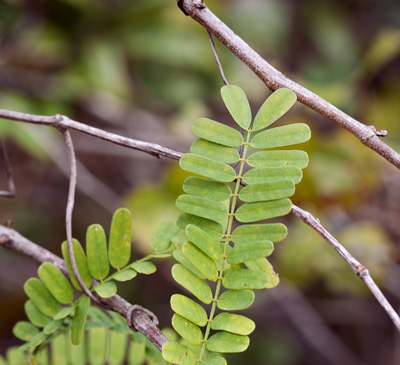This beguiling but invasive plant can kill

BY KENNETH SETZER
FAIRCHILD TROPICAL BOTANIC GARDEN
As published in the Miami Herald, 12/14/13.
A common invasive in the Southeast and across the tropics, rosary pea (Abrus precatorius) has been a pest in Florida for some time. It particularly likes to invade our rare pine rocklands, but it seems to be able to grow almost anywhere around the region.
Unopened seed pods and leaves. Kenneth Setzer/FTBG.
Rosary pea is a climbing, woody shrub-like vine. It roots tenaciously and deeply and sends up root suckers. As a vine, the plant can grow over other vegetation, depriving it of light and thus killing it. It is considered a ruderal species, one of the first to colonize disturbed land.
This perennial vine, sometimes called black-eyed Susan or crab’s eye, is in the Fabaceae family, related to the invasive kudzu as well as peas, soybeans, chickpeas and peanuts, but you wouldn’t want to eat it.

A key to identifying rosary pea is the lack of a terminal leaflet on the compound leaves. Ken Setzer/FTBG.
Several sources indicate it was introduced to Florida as an ornamental from India and Southeast Asia at least by 1932, though no one seems to want to take responsibility for its introduction and subsequent invasion. The Florida Exotic Pest Plant Council ranks it as a Category 1 invasive — invading and disrupting native plant communities in Florida.
It produces a cluster of pale pink flowers during summer. The fruit is a flat, oblong leathery pod, which matures to brown and splits open to reveal the jewel-like seeds.
The most striking part of the plant, the seeds are certainly beautiful. They are five to seven millimeters long, mostly bright orange-red and about one-third jet black. They are quite glossy, and mature seeds are rock hard.
Seeds within an opened (dehisced) pod. Ken Setzer/FTBG.
The common name “rosary pea” supposedly comes from the use of the seeds to make rosary beads. They are still used in jewelry, like necklaces and bracelets, as well as in instruments.
Here’s the problem: The seeds are deadly poisonous. They contain abrin, a toxin chemically similar to ricin. How toxic is that? One source I consulted indicated “One seed well masticated can cause fatal poisoning.” That’s for an adult. It’s even less for a child, since in A Guide to Plant Poisoning (A. Knight & R. Walter, 2001), the authors tell us: “Abrin is one of the most toxic compounds known, requiring as little as 0.00015 percent of a person’s body weight to be fatal.”
I have personally seen bracelets made of rosary pea seeds sold at a local fair in Miami-Dade County. They were intended for infants. Young children, particularly infants, put absolutely everything into their mouths.
The seeds are very hard, and if swallowed whole, can pass through the alimentary tract intact. The seeds need to be opened for the toxin to be released, and infants generally don’t have teeth, so poisoning isn’t a certainty. Poisoning by rosary pea hasn’t turned up much in the news from recent decades; the Miami News of July 20, 1958, mentions it growing at a playground in Sunset Elementary school, noting several poisonings in “recent” years. But why take the chance? Bracelets made with the seeds were recalled in 2011 from a sale in the U.K.
The beautiful seeds of the rosary pea. Ken Setzer/FTBG.
It seems, however, that birds are immune. They are known to eat the seeds and inadvertently spread them. Perhaps they are passing them intact. All animals are susceptible to abrin, however, so be careful of what your dogs or horses consume while outdoors.
There are also stories about deaths resulting from workers drilling holes in the seeds for stringing, pricking a finger and being exposed to the toxin in the process. There seems to be no real evidence for this occupational poisoning, but it makes for a lurid story.
Rosary pea may eventually redeem itself; various extracts are being investigated for use in cancer treatment, as birth control, insecticide and an anti-inflammatory. Scientists are looking as it leaves as a source for a sweetener. Nevertheless, watch out for it, especially in disturbed areas like vacant lots. If you need to dispose of the plant, wear gloves and do not burn it.
